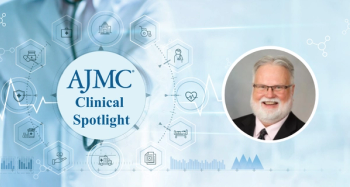
Dr Daniel J. George Discusses the Use of Biomarkers in RCC Treatment
While there are reliable biomarkers to monitor disease progression and guide treatment decisions for tyrosine kinase inhibitors in renal cell carcinoma (RCC), there is a need for biomarkers for immunotherapies.
Blood pressure is one of the best biomarkers to use to monitor disease progression and guide treatment decisions in renal cell carcinoma (RCC), explained Daniel J. George, MD, Professor of Medicine, Member of the Duke Cancer Institute, Duke University School of Medicine, Durham, North Carolina. However, this works for tyrosine kinase inhibitors and biomarkers for immunotherapies are still needed.
In the second part of his interview with The American Journal of Managed Care® (AJMC®), George discussed the use of biomarkers in patients with RCC and research into real-world evidence of treatments in RCC.
In the
AJMC: How can biomarkers help identify patients with renal cell carcinoma who are most likely to benefit from targeted therapies?
George: It's so important to recognize that kidney cancer is a heterogeneous disease. This is not one type. We do studies in clear cell carcinoma, but there's a lot of other forms of kidney cancer that we'll, sometimes, term non–clear cell and even the non–clear cells, there's many different forms of them. And even this classification, which is based on pathology and histology review under the microscope, the truth is that there are a lot of genetic alterations within each of these types, including clear cell and other markers that aren't necessarily at the genetic level, but at the protein level or whatnot.
There's a lot to study in terms of, different features of cancer. These can be biomarkers. It can also be biomarkers that are circulating in the blood or biomarkers that change over time in the course of treatment that are sort of dynamic markers of treatment response. All of these are helpful, because at the end of the day, as we develop more therapies in kidney cancer, we'll want to make sure that we use the right drug or combination in these patients early on. So, having an enrichment strategy—which is how I think of biomarkers—is really important in terms of giving the best treatment to each individual patient.
AJMC: How do you use biomarkers to monitor disease progression or response to treatment in patients with RCC?
Currently, in RCC, there's not a lot of biomarkers that are measurements of response. Our measurements of response tend to be changes on the CT or MRI scan. They can be functional markers that show signs of improvement if the patients have abnormal labs to begin with, like anemia or low protein levels and whatnot. Basic markers of physiology like weight gain and what we call performance status, or their functional status, can be kind of general markers of response as well.
Probably the best example of a biomarker that correlates with a clinical benefit is, believe it or not, hypertension—increases in blood pressure. When we see patients who are on a targeted therapy, like a vascular endothelial growth factor tyrosine kinase inhibitor have an increase in blood pressure, whether it's diastolic or systolic, and even if it's a modest increase. These are really good measures that we're having an effect, we're hitting a target in the patients. Even though that blood pressure isn't necessarily a tumor marker—it's a general health marker—it's been shown to be highly correlative with outcomes, including the response, the duration of response, time to progression, and overall survival. So, to me, it's something I look for when I use a tyrosine kinase inhibitor to see whether or not we're getting an increase in blood pressure. And we'll want to treat that. It's not necessarily that high blood pressure is a physiologically good thing. It's just a marker that the drugs are really hitting their targets and their targets are important in that patient.
AJMC: Can you discuss any specific biomarkers that have been shown to be predictive of response to targeted therapies in RCC, and how do you use this information to guide treatment decisions?
George: I would say for biomarkers in management of RCC, blood pressure is probably my most important marker because it's something we get on patients every single visit, and it's free, it's part of their standard of care. And it's highly predictive of a benefit, particularly on a tyrosine kinase inhibitors, and we use a lot of tyrosine kinase inhibitors still in kidney cancer. And this has been shown with almost every single one of them. So, it's a highly relevant and present biomarker. When I see that increase in blood pressure, I know we're hitting the target.
The tricky thing is when patients are also having other side effects, or if the blood pressure is actually too high, we'll want to lower the dose. And if we lower the dose, what I like to see is that we still have some increase in blood pressure. And even if I instituted antihypertensives, and that blood pressure comes down, if their blood pressure is still in the range of where we started, but now they're on antihypertensives, that's a good sign. That's a sign that yes, we've increased it. Frequently, if we have to hold the drug because of toxicity and have a washout period, if you will, I'll look to see: does the blood pressure come down? Many of my patients will actually have kind of a bottoming out of their blood pressure, we might even have to hold some of their antihypertensives. And that's, again, a good sign that this is a relevant target.
It's the other side, where I'm giving a patient a tyrosine kinase inhibitor and I'm not seeing any increase in blood pressure or I'm not seeing that much toxicity that I get worried that we may not be dosing enough. It's not often, but sometimes I'll increase the dose of my tyrosine kinase inhibitor in patients because I'm concerned we may not be having enough toxicity, particularly the increases in blood pressure.
The other marker that sometimes correlates is, believe it not, thyroid-stimulating hormone or TSH. When we stress the thyroid, it's another sort of correlate with a benefit. In some of my patients that are on a lot of antihypertensives, I'll look to the TSH as a marker. That also is an indication we're in the right zone for a dose for that drug.
AJMC: How do you see the role of biomarkers evolving in the management of RCC in the coming years, and what implications do you think this will have for clinical practice?
George: I believe that in the coming years, we're going to develop much more treatment-specific biomarkers. I mentioned hypertension and thyroid as indicators for the tyrosine kinase inhibitors, but our immunotherapies are becoming more and more the workhorse and the driver of long-term disease response in kidney cancer. We're going to want to have our biomarkers for that, and some of those may be circulating markers. Some of them may, believe it or not, be markers that we're getting from what we call the microbiome, or the bacteria, in your gut. And some of them may be markers we've yet to discover.
There are 2 types of biomarkers. There are those that are static. Maybe we check them once in the surgical pathology of a patient, like the presence of sarcomatoid features in the cancer. A sort of inflammatory type of response in the cancer is a marker of enrichment to response to these immunotherapies. But it's static. It's not something we can keep checking over time. So having some correlates of that in the blood or in other, fluids would be really helpful. And being able to know, is this a target that we need to continue to treat? Is it a target that maybe clears and we can stop our immunotherapy? Or when patients are progressing there's a maybe a rationale for either continuing or switching our immunotherapy based upon the presence of markers.
I think having biomarkers particular for immunotherapies and ones that are dynamic over time is sort of the next, big step in our correlate of work in managing and optimizing kidney cancer treatment.
AJMC: Finally, what are you working on in RCC that you are excited to share?
George: Well, there's a lot we're working on in RCC. One of the things I'm personally working on is real-world evidence. We do so many clinical trials in kidney cancer that we don't follow up on in practice. What's most important to me is not the data that leads to an FDA approval, but actually changing the outcomes of patients everywhere. Because the truth is, most of our patients are not ending up on a clinical trial. Maybe they are not even qualified for a clinical trial or have access to one.
If our treatments don't translate into benefit or a broad patient population out there, we're missing some. And that's what we need to find out. We're doing that in a prospective national registry called ODYSSEY RCC. It's embedded in patients that are being seen at sites as part of something called the PCORnet it's a research arm of Medicare that has set up a network of electronic health records that we can pull data from, and it allows us to identify patients and get basic baseline information and then pull their outcomes and treatments and complications through that electronic health network.
I think it's going to give us opportunities to explore some biomarkers, imaging markers, some pathology markers. Artificial intelligence may help us as our numbers increase. But it's going to give us the real-world experience of treatments and how patients are tolerating and benefiting from them. And what are we missing? Can we design treatments in the future for patients who maybe wouldn't qualify for our clinical trials. Treatments that are gentler or maybe more accessible for patients, more financially accessible? These will be really important unmet needs in the future. And real-world evidence really opens the door to where these opportunities are best focused.
Newsletter
Stay ahead of policy, cost, and value—subscribe to AJMC for expert insights at the intersection of clinical care and health economics.






